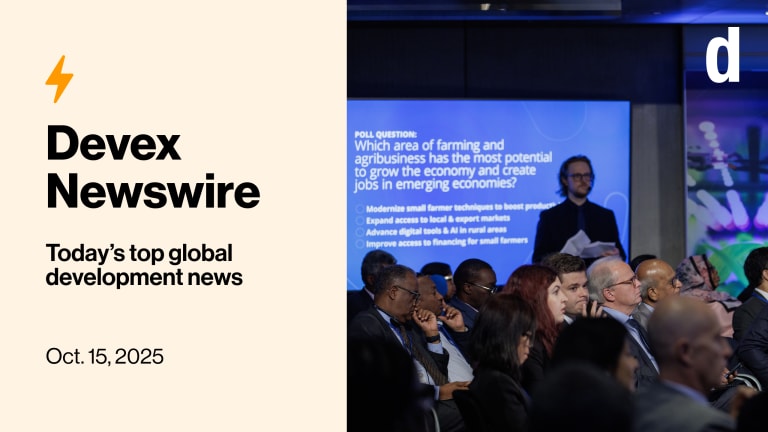
WASHINGTON — A U.S. Agency for International Development and Inter-American Development Bank innovation challenge to improve conditions for Venezuelans inside and outside their country has garnered over 1,000 applications in its first months, organizers said Thursday.
The BetterTogether Challenge, launched in October, aims to crowdsource ideas from Venezuelans and others around the world to solve problems facing people living in the economically collapsed country as well as the Venezuelan refugees and migrants who have spread across Latin America. The challenge is expected to run for two years, based upon the availability of funds, and winners can be awarded between $25,000 and $1.5 million.
“You could actually [turn] a situation which is a desperate situation into an opportunity to really make a big difference [in the] long term for everyone in those countries.”
— Irene Arias Hofman, CEO, IDB LabMore on Venezuela:
► Colombia to expand temporary legalization measures for Venezuelans
► Donors offer 'solidarity' for Venezuela crisis but few dollars
► USAID reprograms Central America funds for use inside Venezuela
“We’re humble enough to know that we don't have all the answers. The Venezuelan crisis is so complex and so multifaceted,” said John Barsa, USAID assistant administrator for Latin America and the Caribbean, at an event in Washington. “We’ve thrown it open to solutions from anywhere. … It could be how to have Venezuelans employed in the economy in Colombia. It could be solutions on how to improve the situation inside the border in Venezuela.”
The challenge is accepting proposals that fit into at least one of four categories: people, productivity, services, and finance. The “people” category seeks solutions that will build skills and networks and promote social cohesion and peaceful relationships; “productivity” proposals should increase access to livelihoods and goods necessary for daily life; “services” applies to those that improve service delivery in a variety of sectors, such as health and education; and “finance” solutions should improve access to capital.
USAID’S partnership with IDB taps into the creativity, innovation and entrepreneurial spirit of the bank’s IDB Lab to help incubate promising submissions, said Irene Arias Hofman, CEO of IDB Lab. Many of the applications received so far have been from inside Venezuela, and if selected, those ideas will receive access to the lab’s network for further support in development and scaling, she said.
“In addition to the financial support, it’s also an opportunity for those who apply to be connected to [these] larger networks in the region,” Hofman said.
The range of financial support in grants, loans, and equity is meant to allow for ideas at all stages of development to have a chance at acceptance. The $25,000 level will fund development and testing of an early stage idea, the $250,000 level will fund the pilot and evaluation of an existing prototype, the $500,000 level will fund broader market viability for already successful pilots, and the $1.5 million level will fund projects with demonstrated commercial viability or public sector partnerships in the region.
The IDB Lab team has already seen proposals “that are really forward-looking” in terms of addressing challenges around education, labor and jobs, identity, and financial access, Hofman said.
Hofman added that IDB staff in countries where winning challenge solutions will be implemented, including Argentina, Brazil, Chile, Colombia, Ecuador, Guyana, Panama, Peru, and Trinidad and Tobago, are involved in spreading the word in the region about the opportunity to access the funds. IDB will make an effort in the coming months to seek out additional applications from countries that have thus far submitted few, she said.
USAID and the IDB Lab are reviewing the first 200 applications but have not said when winners will be announced. Organizers are hoping solutions that are awarded funds from the challenge will help spur additional ideas from others in the region. Applications will be accepted on a rolling basis.
“Our mandate is to use innovation and to bring more inclusion and to address solutions for vulnerable populations,” Hofman said. “What we hope for also is that the situation in the countries where those who have left also improves. Not just for Venezuelans but for the host communities. … What are those skills of the future that you need? You could actually [turn] a situation which is a desperate situation into an opportunity to really make a big difference [in the] long term for everyone in those countries.”






